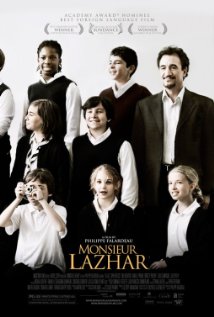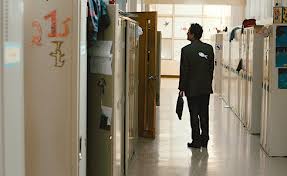 In an elementary school in Montreal, Canada, an Algerian immigrant, Bashir Lazhar, is hired to fill in for a female teacher who commits suicide in the classroom. He straightforwardly faces the students in the homeroom who haven’t yet recovered from the shock of their dead teacher and opens the hearts of these children. However, Lazhar carries his own sad past and secrets. Lazhar experienced the violent civil war in his home country and came to Canada as a refugee. His wife and children were killed by terrorists; he has been trying to get permanent residence in Canada as a political exile; and he didn’t actually have any qualifications as a teacher or experience teaching. When the principal finds out about Lazhar’s lack of qualifications, Lazhar is fired, but he leaves a powerful impact on the students.
In an elementary school in Montreal, Canada, an Algerian immigrant, Bashir Lazhar, is hired to fill in for a female teacher who commits suicide in the classroom. He straightforwardly faces the students in the homeroom who haven’t yet recovered from the shock of their dead teacher and opens the hearts of these children. However, Lazhar carries his own sad past and secrets. Lazhar experienced the violent civil war in his home country and came to Canada as a refugee. His wife and children were killed by terrorists; he has been trying to get permanent residence in Canada as a political exile; and he didn’t actually have any qualifications as a teacher or experience teaching. When the principal finds out about Lazhar’s lack of qualifications, Lazhar is fired, but he leaves a powerful impact on the students.
This movie was nominated for the Academy Award for Best Foreign Language Film and it was praised highly in many countries, but I was not very impressed with this movie. First of all, it seems strained that the teacher would hang herself in the classroom. Did she choose this time and place for her suicide so that the male student involved in her problem could discover her? At one point, Lazhar wonders out loud why she would commit suicide in the classroom, but a coworker who was close to her just says, “Because she seemed to be a little bit mentally ill for some time.” Since the teacher was supposedly popular with the children, why wouldn’t any of the students or surrounding people think to question her mental condition? Also, why would Lazhar who had no teaching experience suddenly apply to fill in for the teacher who committed suicide? Furthermore, it is not very convincing that Lazhar would be hired at the school to teach without permanent residence and without the school performing a background check.
 At any rate, the movie seems to focus on the students that are wounded from their teacher’s suicide, and, despite his more profound injury, Lazhar is able to heal with his cheerful attitude; the story doesn’t seem to care how he got there, or maybe the intention is to make the message more moving by having a dramatic story. When a suicide happens within the school, a school must proceed very cautiously in order to avoid inadvertently causing any more trouble. Since suicide is such a serious issue, there must be a serious buildup that leads to the suicide; however, the way the movie used the suicide as a tool to move the story along without considering the background of the suicide was not convincing. It should have been the boy who drove the teacher to commit suicide who was most wounded by the teacher’s suicide, but the movie widely incorporates the whole class and the development of the story mainly relies on the particular little girl who opens up to the protagonist Lazhar. Because of all this, the message of the movie did not reach me.
At any rate, the movie seems to focus on the students that are wounded from their teacher’s suicide, and, despite his more profound injury, Lazhar is able to heal with his cheerful attitude; the story doesn’t seem to care how he got there, or maybe the intention is to make the message more moving by having a dramatic story. When a suicide happens within the school, a school must proceed very cautiously in order to avoid inadvertently causing any more trouble. Since suicide is such a serious issue, there must be a serious buildup that leads to the suicide; however, the way the movie used the suicide as a tool to move the story along without considering the background of the suicide was not convincing. It should have been the boy who drove the teacher to commit suicide who was most wounded by the teacher’s suicide, but the movie widely incorporates the whole class and the development of the story mainly relies on the particular little girl who opens up to the protagonist Lazhar. Because of all this, the message of the movie did not reach me.
This movie’s background is that Abdelaziz Bouteflika was elected as the president of Algeria in 1999 to put an end to the Algerian Civil War that had been developing over the last 10 years; he was forced to compromise with the opposing group within the country and so he acquitted the past political crimes of extremists by granting amnesties. Because Lazhar’s wife published a book that criticized this, his family was threatened by extremists and eventually his family was killed by terrorists.
Mohamed Fellag, the theatre actor and comedian that played Lazhar, also has the history of escaping from Algeria. Triggered by a bombing of his stage in 1995, he took refuge in Tunisia and, from there, France. This movie was based off of a one-man play and the play’s author—Évelyne de la Chenelière—highly recommended Mohamed Fellag for the role of Lazhar, but it is said the movie director—Philippe Falardeau—thought Fellag’s acting was too theatrical and did not immediately support the choice. However, Fellag’s training on the stage and real-life experience seemed to prove enough to persuade the director.
